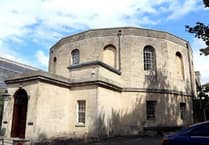DISGRACED Forest tycoon Royston Martin Knight walked free from court after being convicted of a string of serious business offences.
Knight, who was described by Judge Michael Longman as fraudulent and dishonest, had admitted continuing to act as a company director after being declared bankrupt or while being disqualified.
He left a labyrinthine trail of business interests and companies stretching from a converted chapel in Drybrook to the republic of Panama.
Judge Longman sentenced Knight of the Old Chapel in Drybrook to 13 months in prison, suspended for two years.
The judge also imposed a curfew between 8pm and 6am to last for four months, ordered Knight to carry out 100 hours of unpaid community work and disqualified him from being a company director for 10 years.
He also warned Knight that if he defaulted in paying £31,000 of the prosecution’s costs of £250,000 he would be sent to prison.
The court heard that Knight had fled Britain for Panama but, after running out of money and accruing large debts, returned to Britain in 2013 after 15 years, when he was arrested at Gatwick Airport.
Richard Shepherd, prosecuting, said an investigation into Knight’s business activities in the past week showed that: “He is still rolling on and rolling off as a director of various companies.
Knight’s offences date back to a period between 2000 and 2004 when he was both bankrupt and subject to an order disqualifying him from acting as a director for a period of five years.
Despite these restrictions, he was improperly involved in a number of limited companies in the Gloucestershire area, one of which went into liquidation with creditors totalling £552,947.03.
Criminal proceedings were commenced against Knight in 2004 by the then-Department for Trade and Industry, by which time, he had left the UK.
A warrant was obtained for his arrest and in November 2015, on returning to the UK from Panama at Gatwick Airport., Knight was arrested and brought before Gloucester Crown Court to face charges. The case was later transferred to Bristol Crown Court.
His conviction follows a prosecution by the Insolvency Service.
Deputy chief investigating officer, Liam Mannall said: “This case involved serious wrongdoing and is a demonstration of the long memory that justice retains.
“The insolvency regime should not be abused, nor should a disqualification order be ignored, the consequences are likely to catch up with those who ignore this.”




